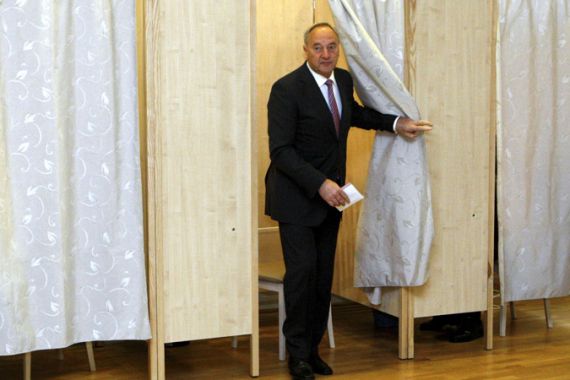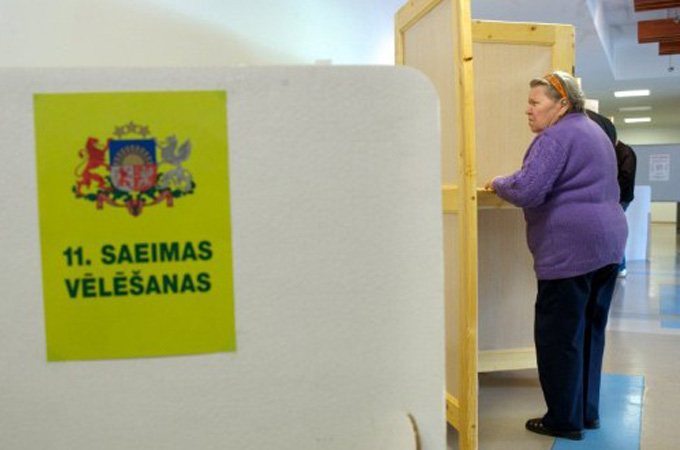Pro-Russia party wins Latvia’s snap election
Left-wing Harmony Centre party gains a milestone victory, but falls short of an absolute majority.

 |
| Latvian voters have ushered in a left-wing party in a break from a 20 year stint that shunned Russian influence [AFP] |
A left-wing, pro-Russia party has captured the most votes in Latvia’s parliamentary elections, marking a milestone for the tiny Baltic nation where parties distrustful of Russia have dominated all national elections since independence 20 years ago.
With some 90 per cent of the vote counted early on Sunday, Harmony Centre, a party catering to the country’s ethnic Russian minority, had 29.5 per cent of the vote.
The elections come three months after the country’s legislature was dissolved over a corruption crisis.
Since 1991, when Latvia regained its independence after the breakup of the Soviet Union, no such party had either won an election or been included in a coalition government, a streak that Harmony hopes to change after Saturday’s election.
But other parties were already manoeuvring to shut Harmony out of any coalition government.
Approximately one-third of Latvia’s 2.2 million people are minorities whose native language is Russian. Many of them are “non-citizens” who lack the right to vote.
Latvia was occupied by the Soviet Union for a half-century after World War II.
An upstart party formed by former President Valdis Zatlers was in second place with 20.3 per cent, while Unity, the senior partner in the current ruling center-right coalition, was third with 18.1 per cent.
Coalition talks
Leaders of these two partie, which could together pull in about 45 seats in the 100-member Parliament, have suggested they would begin coalition talks immediately in order to seize the initiative from Harmony in forming the next government.
Analysts believe the two parties are likely to leave prime minister Valdis Dombrovskis in his position, which would be a key signal to international lenders and investors who want assurances that Latvia will stick to its commitments to cut its budget deficit and keep on track to adopting the euro in 2014.
Still, to secure a parliamentary majority, the two parties will probably have to invite one of three parties expected to break the 5 per cent barrier required to gain seats in Parliament.
Other than Harmony, there is the populist Greens and Farmers Union, which was gaining 12.4 per cent of the vote, and the right-wing National Alliance, with 13.3 per cent.
But since the two center-right parties have sworn not to cooperate with the populists, they face a stark choice for a third coalition partner: either the pro-Russia Harmony or the Russia-hating National Alliance.
“Forming a coalition, I think, will be more difficult than a year ago,” former President Vaira Vike-Freiberga told public radio on Saturday.
“Honestly speaking, I don’t see that we are being offered something that could drastically change the situation.”
Saturday’s snap ballot was forced by a July referendum in which more than 90 per cent of voters backed a move by then president Zatlers to dissolve parliament over graft fears in so-called “oligarch parties”.
After being ousted from the presidency in July, Zatlers formed his own party bent on rooting out corruption – a move that proved popular in light of Saturday’s swift rise to second spot in the polls.
Boom turned to bust in Latvia in 2008 when it saw its economy shrink by 25 per cent over two years, marking the world’s deepest plunge in output.
The international bailout paired with deep cuts in public spending has pulled the 2004 EU member out of recession, with its economy expect to grow as much as 5 per cent this year.